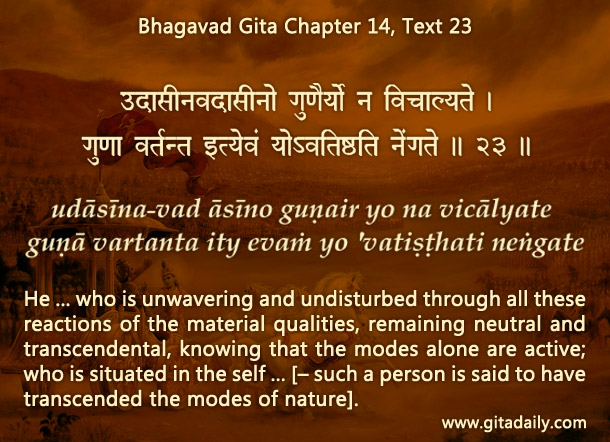Whenever we do something regrettable, we wonder, “Why did I act so thoughtlessly?”
First, we are never literally thoughtless, for we are never without thoughts. Then, what exactly happens when we act thoughtlessly? The thoughts which impel us to act receive too little evaluation and too quick sanction. To prevent such thoughtlessness, we need to stop identifying with our thoughts.
How can we distance ourselves from our thoughts? By seeing them as automatic mental notifications, like those coming on our phones. Our mind is like the phone, and our mind’s programs generically correlate with the three modes of material nature. Pertinently, the Bhagavad-gita (14.23) urges us to situate ourselves in our spiritual identity and observe our thoughts dispassionately.
Isn’t observing our thoughts difficult? Yes, especially so when the lower modes of passion and ignorance become active within us, triggering many unproductive or counterproductive thoughts. Such thoughts crowd and cloud our inner world, making evaluating them nearly impossible. As we can’t possibly evaluate all our thoughts, we need to minimize the evaluation needed by purposefully structuring our life, whereby we broadly plan what we will do when. If a thought impels us to deviate from that structure, we can know that such a thought needs critical evaluation. Some such thoughts may be useful, but most will be pointless and many will be harmful.
Given that life can be unpredictable, how can we structure our life realistically? By staying centered not on the structure but on our life’s ultimate purpose of serving our all-attractive Lord, Krishna. When we connect devotionally with him, we get the inner stability to discern what kind of structure works best for us.
By thus observing our thoughts and structuring our life, when we learn to disidentify with our thoughts, we start acting more thoughtfully.
Think it over:
- What does being thoughtless mean and not mean?
- Why is evaluating our thoughts difficult? How can we make it easier?
- How can we structure our life effectively?
***
14.23 He … who is unwavering and undisturbed through all these reactions of the material qualities, remaining neutral and transcendental, knowing that the modes alone are active; who is situated in the self … [– such a person is said to have transcended the modes of nature].
To know more about this verse, please click on the image
Explanation of article:
Podcast:


Thanks for this… I really needed it.
Happy to be of service.
Thoughts are the perceptions of the MIND